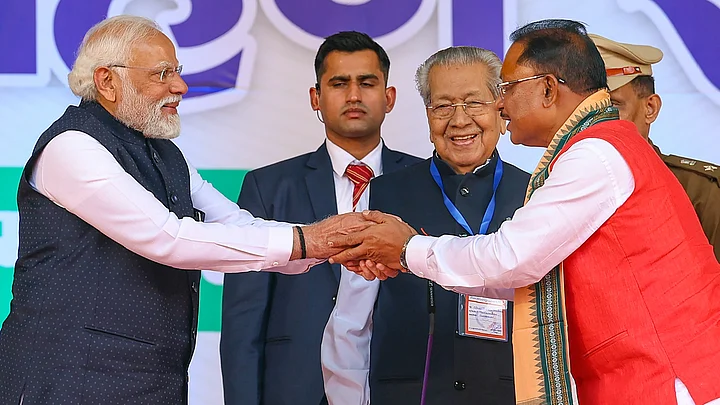In the presence of Prime Minister Narendra Modi, Home Minister Amit Shah, and other senior Bharatiya Janata Party (BJP) leaders, the party's tribal pick for Chhattisgarh – Vishnu Deo Sai – assumed office as the new Chief Minister of the state on Wednesday, 13 December.
Even though his immediate political challenge is to ensure a sweep for the BJP in the 2024 Lok Sabha elections, the road ahead for the first-time tribal chief minister Sai in the state itself "will not be easy", according to experts.
From the ongoing protests in Bastar over alleged atrocities by security forces against tribals to the coal mining tussle between tribals and corporates, and from an increasing burden of debt (Rs 82,000 crore till March 2023) to the rise in communalism in the state – they say the challenges before him are aplenty.
In this article, we break them down one by one.
Bastar, Maoism, Conversion, and Tribal Rights
While the BJP hasn't made any particular promises to the tribals of the Maoist-infested Bastar, the appointment of a tribal leader as the chief minister has raised hopes.
But, talking to The Quint, Vikas Tiwari, a senior journalist based out of Bastar, who also runs his YouTube channel Bastar Talkies, cautions that although people have renewed expectations, "they shouldn't count their chickens before they are hatched".
Bastar witnessed multiple protests during previous chief minister Bhupesh Baghel's tenure over issues such as police atrocities, mining, and extra-judicial killings of the tribals.
“It's a much-celebrated thing among the locals that a tribal has been made the chief minister. They have high hopes of getting rid of Maoists, the excesses committed against the community members by the security forces, but the BJP hasn't promised any of that."Vikas Tiwari
Moreover, the unresolved incidents of fake encounters in Sarkeguda (2012) and Edesmetta (2013) present a sensitive issue for Sai. How he handles these – whether by taking action on the judicial commission's reports or by ignoring them – remain to be seen.
The inaction by the Congress government after the judicial commission reports concluded that the encounters were fake cost them dearly – so, Sai will be tested on his approach to this sensitive issue, experts opine.
Another major challenge for the newly formed BJP government is the conversion issue in Bastar. Since both the communities in the fight are tribals – one set of whom now follow the Christian faith – a tribal chief minister's stand will be closely watched.
"This time the conversion issue had taken most of the limelight in the run-up to the elections, and that's why the tribals who are protesting against the police camps and the alleged extra-judicial killings shouldn't count their chicken before they are hatched,” added Tiwari.
Another young tribal journalist of Bastar, wishing not to be named, said that the youth are more interested in what the BJP government offers in terms of jobs, inclusion in the mainstream, and removing of the Maoists.
“Most of the voters of the younger generation now have access to mobile phones. They want to be given a way to be more inclusive, to study, have job opportunities, and be a part of modern ways of living. They are hoping for options to pursue different careers. If the BJP can deliver on these hopes, nothing else can make their voter connect stronger,” the journalist said.
Coal Mining and Communalism in North Chhattisgarh
While one side of the state is mired in Maoism, tribal protests, and conversion issues, the other end – north Chhattisgarh – has its own set of challenges and hopes from a chief minister who hails from their region: Kunkuri in Jashpur district.
North Chhattisgarh is home to one of the most pristine forest ranges, Hasdeo, under which lies an immense deposit of coal that had become a point of contention between the locals and the previous Congress government.
With Sai taking the reign – and the BJP pushing its pro-tribal image – it would be worthwhile to see if the new chief minister sides with the locals who are demanding an end to coal mining or with the corporates who are vehemently pushing for the opening of more coal mines.
Besides mining, the BJP’s push for ‘ghar wapsi’ – an anti-conversion drive initiated by the Judev family with whom the current chief minister is known to have very good relations with – will also be closely watched.
“He [Sai] is the biggest BJP leader in north Chhattisgarh after Judeo [late Dilip Singh Judev, a stalwart of north Chhattisgarh’s politics] who led an anti-conversion campaign across the state. After Judeo died, it was Sai who quietly worked among the tribals and gained popularity,” Sushant Shukla, the BJP MLA from Beltara, had told Hindustan Times.
A senior journalist, based out of Jashpur, told The Quint that since Sai has been an active participant in the anti-conversion drive run by the Judev family, it's highly unlikely that he will change his course on the matter.
“He was a very prominent part of the anti-conversion drive in northern Chhattisgarh. It's doubtful that he will correct his course now. There are strong chances of him stepping up the game and pushing for a harder campaign against the conversion to consolidate the majority tribal community voters further,” the journalist said.
As both north and south Chhattisgarh present unique challenges, the central plains – the agrarian region – also come with issues of its own.
The rising debt on the state government in the face of a cash transfer scheme announced by the BJP, which promises to disburse a sum of Rs 12,000 to the married women of the state, will be a tough point to settle without raising the burden of taxes on the masses.
The BJP has also promised to pay an increased MSP (minimum support price of Rs 3100) for paddy to farmers in a single installment.
(At The Quint, we question everything. Play an active role in shaping our journalism by becoming a member today.)
